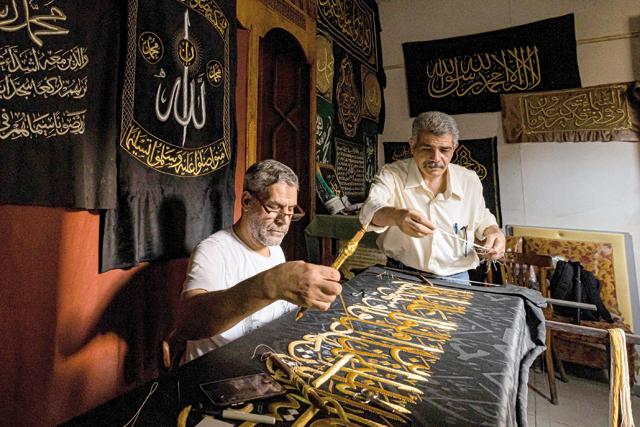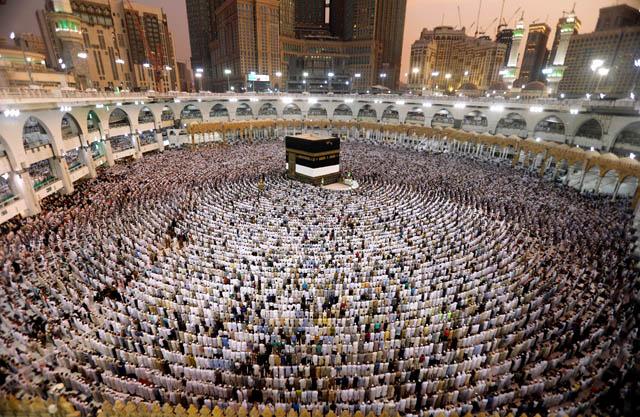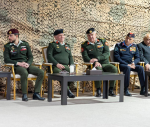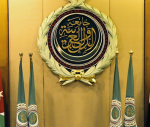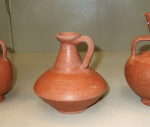You are here
Saudi factory stitches gold-laced cover for Islam’s holiest site
By Reuters - Aug 27,2017 - Last updated at Aug 27,2017

A man embroiders the Kiswa, a silk cloth covering the Holy Kaaba, ahead of the annual Hajj pilgrimage, at a factory in the holy city of Mecca, Saudi Arabia, on Saturday (Reuters photo)
MECCA, Saudi Arabia — Dozens of Saudi craftsmen, mostly in their 40s and 50s, are hard at work in a factory in Mecca preparing an embroidered black and gold cloth to cover the Kaaba, the holiest site in Islam.
Known as the kiswa, the cloth is woven from silk and cotton and adorned with verses from the Koran. A new one is made each year to be placed on the Kaaba in Mecca's Grand Mosque during the annual Muslim Hajj pilgrimage, which begins on Wednesday.
Many of the craftsmen have worked in the factory in the Oum Al Jood district of Mecca all their lives but they will retire soon, so a new generation is being trained to carry on the trade.
General Manager Mohammed Bin Abdullah Bajuda said King Salman had ordered all the machines, which were introduced some 30 years ago to help automate the process, to be replaced with newer ones by next year.
"He also called for a new cadre of manufacturers to take the place of the current one," Bajuda said during a visit to the factory on Saturday.
A cube-shaped stone structure, the Kaaba is a focal point of the Hajj, during which some 2 million pilgrims walk around it in a mass ritual.
When Muslims anywhere in the world say their prayers five times a day, it is towards Mecca and the Kaaba that they face.
The Kaaba's black stone was revered even before the birth of Islam. Muslims believe it was originally built by the prophet Ibrahim, the biblical Abraham, on the site of the first house of worship built by Adam. It has since been rebuilt more than once.
'The best feeling'
The kiswa was manufactured in Egypt until 1962. There have been red, green or white coverings in centuries past, but now it is always black with embroidered gold calligraphy.
Nearly 670kg of silk, enough to cover a structure estimated to measure about 15 metres high and 10 to 12 metres long, is imported from Italy. Silver and gold-plated thread comes from Germany.
But the kiswa is embroidered and stitched together in Saudi Arabia and paid for by the kingdom each year at a cost of $6 million.
Asked about that expenditure at a time of austerity in the kingdom, Bajuda said: "This glorifies the house of God. The Kaaba more than deserves this honour."
Waleed Al Juhani has worked at the factory, which opened in 1977, for 17 years.
"Thanks to God we are working to serve the holy Kaaba. This is a great blessing," he said, while embroidering a Koranic verse that takes 60 days to complete.
"When we succeed in our work, we are glad that Muslims will celebrate a new cover for the Kaaba. This is the best feeling."
At the end of Hajj, the used cloth will be cut into pieces to be distributed to dignitaries and religious organisations. Recipients regard the fragments as heirlooms.
This year's kiswa is complete, but the workers have already started on the next one.
Related Articles
CAIRO — Under the steady hum of a ceiling fan, Ahmed Othman weaves golden threads through black fabric, creating Koranic verses, a century a
MECCA — Mask-clad Muslims began the Hajj on Wednesday, circling Islam's holiest site along socially distanced paths in the smallest pilgrima
MECCA, Saudi Arabia — More than 2 million Muslims from around the world began the Hajj pilgrimage at Islam's holiest sites Wednesday, a reli


